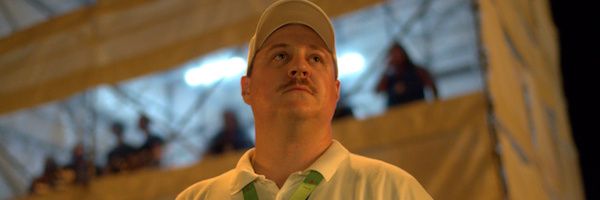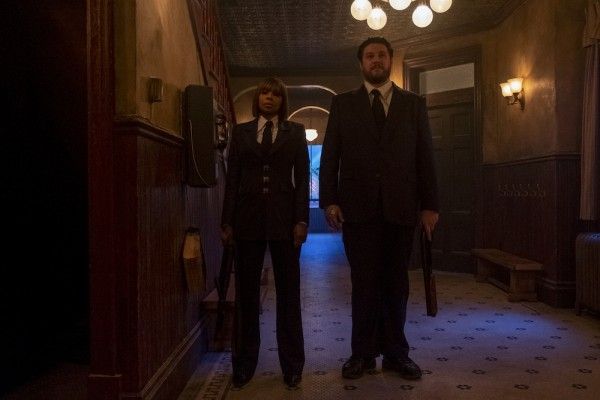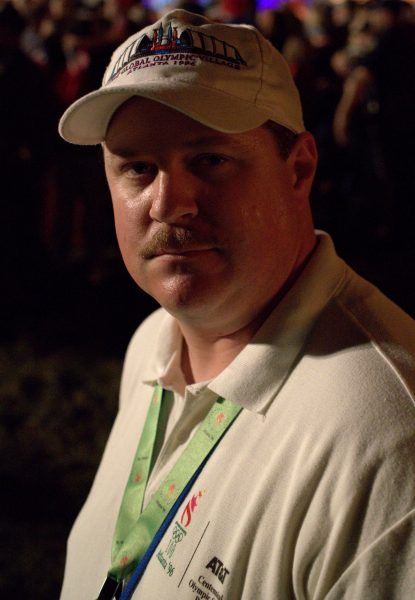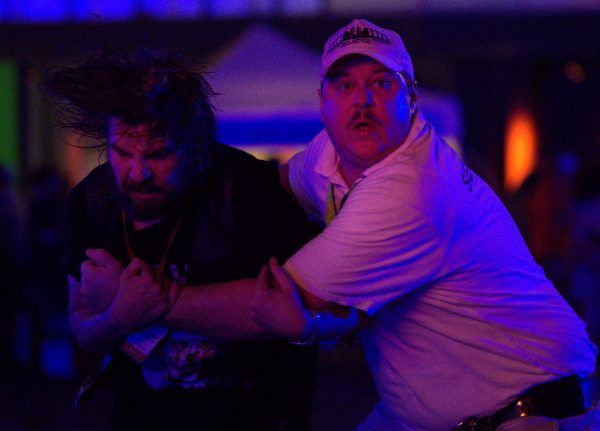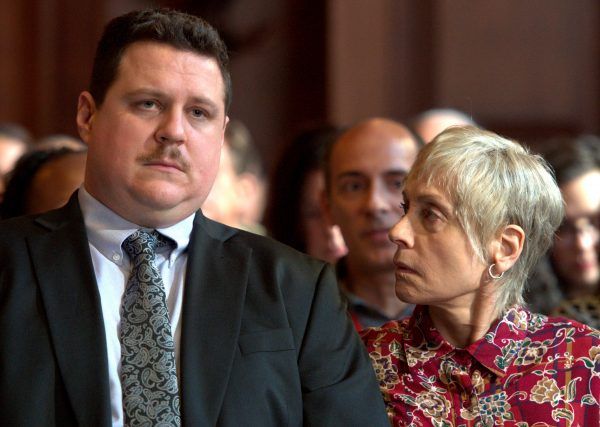From show creator Andrew Sodroski (who also did the season about the Unabomber, featuring Paul Bettany and Sam Worthington, that aired on Discovery), the Spectrum Originals drama series Manhunt: Deadly Games chronicles the deadly bombing at the 1996 Olympic Games and the complex manhunt that followed. After first pointing the finger at the wrongly accused and innocent Richard Jewell (Cameron Britton), whose life was turned upside by the FBI and the national news media while he fought to clear his name, the FBI then focused their hunt on elusive serial bomber Eric Rudolph (Jack Huston), who had a very clear and dangerous agenda of his own.
While at the Spectrum Originals portion of the Television Critics Association Press Tour, Collider got the opportunity to sit down and chat 1-on-1 with actor Cameron Britton about how he loves a challenge when it comes to trying to find roles that are different from anything he’s done before, the scene that sold him on this project, how he approached playing Richard Jewell, his hope that the recent Clint Eastwood film and this series will change the perception of Jewell, the gift of a co-star like Judith Light (who played Jewell’s mother), and what he’d like to do next.
Collider: First of all, I have to say that I absolutely loved your work in The Umbrella Academy. Are you in Season 2?
CAMERON BRITTON: I’m not allowed to talk about it, but I speak with Robert [Sheehan] a lot. I wish he lived in Atlanta. I miss him very much. You don’t always meet someone on set, where you continue your relationship afterwards. Robert Sheehan is one of those folks that I just adore endlessly. Judith Light, on this project, is another one. When you meet one that’s really special, you try to keep in contact. But Robert lives in London, so it’s difficult.
If you just look at your roles in The Umbrella Academy as Hazel and Manhunt: Deadly Games as Richard Jewell, they’re such very different characters. Is that intentional, on your part?
BRITTON: I do love that challenge. I try to find roles that are different from any role I’ve done, to see if I can do them. I never know, until the project’s over, what that’s gonna look like. It’s a big experiment. That keeps the pressure off, on set. With any character, you start your preparation with, what is this person’s strengths? What are the beliefs of this character? And I did the opposite with Jewell, which was nerve-wracking. I asked, what are his doubts? What are his faults? I found that to be the most interesting part of this show. The more faults and fear we see in him, the more poignant the acts of heroism are, and the more his character and strength comes out during all of this adversity, the more it resonates. I found him to be a walking apology, and I’m a walking apology. I fought for years to not be one, but I’ve found that there are days where I just feel guilty for being in people’s way and just being in the room, at all. And when I saw that in Richard, I thought, this is something that I’d like to express and vent. I was hoping it would be cathartic. It hasn’t been yet. It was really hard. Every day was like, “Oh, god, I’ve gotta drag up all of these old feelings from middle school.” But by the end of the show, you see a full adult there, a mature man, and someone who realizes who he is and what people are, and stops idealizing or feeling like some are worthy and some aren’t. People are just people. It took a horrible circumstance and trial by fire to find that, but he did. Not everyone can say that. We can look at heroes and say, “Oh, yeah, there’s the jawline and witty banter,” but that’s not what a hero is. Any chance that I could find to show that this man has flaws, I thought was important, to remind us what heroes are.
Does it feel very different, when you’re playing someone who was a real person? Did you feel like you had more freedom on something like The Umbrella Academy?
BRITTON: No. I have to base my characters off of at least one person. This actually makes it a lot easier. The part that makes working on someone who’s real difficult is knowing when to stay true to it and when to move away. If you watch Richard Jewell, externally, he’s not really anything like what I perform, but I wanted to pull out his flaws. I find working on real people inspires me that much more to make it truthful, which is another obsession of mine. I’m just trying to find the most honest way to perform things.
When the possibility of this came up, did you need to convince yourself to take it on?
BRITTON: I read the interrogation scene. That was the audition scene. In Episode 2, he has this interrogation scene, and that happened in real life. The FBI pulled him in and pretended to be doing a training video, but really, they were interrogating him. I read that scene, and there was so much going on. You have someone who idealizes the police. They’re his heroes, and they’re tricking them. And when he realizes that, there’s a lot going on for him, in that moment. His world comes crashing down. Obviously, you’re scared that you might get the electric chair, if these people think you’re a bomber. Everything you believe is being challenged. I pretty much leapt at the chance to do that. A long form version of the story, watching someone’s life play out, was alluring.
How did you find the experience of working with show creator Andrew Sodroski?
BRITTON: I loved working with Andrew Sodroski because he was so flexible with the script. There wasn’t a lot of improv, but there were discussions about what to do with dialogue. I think projects are best served when everybody’s willing to change things for artists, to tell the story in the best way possible.
With this, it’s so interesting that you’re telling a story about two different men, but they’re not really crossing paths with each other or having any interactions with each other, even though they affect each other’s lives, drastically.
BRITTON: In real life, Eric Rudolph was movie star gorgeous and hated law enforcement, and Richard Jewell was overweight and awkward and only cared about doing the right thing and saving people. It’s just so ironic. And Jack [Huston] does an amazing job of being charming and believable, as a good person, when he’s a fucking psychopath.
How did your thought process on Richard Jewell change, throughout this? Once you figured out what you wanted to do and who he was, did that lock in how you felt about him?
BRITTON: I admired him more and more, for what he went through and how he came out stronger, on the other end of it. It wasn’t easy. To actually do it in real life would obviously have been a lot worse. I spent a whole season as Jewell, and I can’t imagine what he went through. I don’t think you can, unless you’ve been through it. That must’ve been hard for him. There’s no support group for the whole world hating you, unfairly. I’m glad the movie (Richard Jewell, directed by Clint Eastwood) came out, and I’m glad that this show is coming out because there are still people who think he did it. And I wish he were alive today, to see Hollywood help exonerate him.
One of the most tragic aspects of all of this is that he’ll never see the change in representation of him.
BRITTON: No, he can’t. He died in a small town, getting paid pretty low wages, as a policeman. But he did get to be a policeman. That’s all he wanted. All he wanted to do was serve and protect. He felt a calling, which just makes it all the more messed up that the law enforcement was, making the mistakes that they were with them. But I think it helped him learn to be informative, as law enforcement, and not punitive, which I think is something that a lot of policemen still need to learn. Their job is to inform the public. If you pull someone over and you realize that they’ve learned their lesson, they don’t need a ticket. But they wouldn’t own up to this mistake. They still really haven’t. The Atlanta Journal-Constitution sure hasn’t.
What was it like to work with Judith Light? She seems like such a gift to an actor.
BRITTON: She is. She is perfectly east coast and west coast combined. She’s like this straightforward peacenik. I still comfortably call her mama. She’s just loving and dedicated. She was crying at the table read, in an $8 department store wig, like it was her first project that she’d ever done. No matter what was going on in her life, she just came ready and happy and excited. She doesn’t judge her work, and is there for others. I’d be really happy goes the direction hers has. She’s always fun. She’s always happy to be there and to do the work, and then let it go, which is just as important is doing the work. You have to just set it free once, once they call cut.
You’ve talked about how hard this was to do. What did you do once the shoot was over?
BRITTON: I had a couple projects. Folks were hoping to work with me, and I just say, “Thank you, but I need a break.” I have an eight-month-old kid. He was born, and then a month later, we started shooting, and he’s my first kid. You’re exhausted and your priorities are skewed. So, when this ended, all I did was just hand out with my kid and decompress, which is par for the course. No matter what the experience on set was, I like to take a break between roles, get it out of my system, and be clear and ready and excited to start working again. So, I spent time at home with family. Watching the show is a little hard, but I’m getting back to the basics and starting to go out there again.
Have you thought about what you want to do next?
BRITTON: Yeah, I’d like to play someone who isn’t disturbed or troubled. I do really like focusing on people’s faults. I like characters who make mistakes. But it would be nice to play a more confident fellow for whom things are going right. I kept telling the writers, could we just do a scene where Jewell talks about the weather, or asks someone what does today’s special is at a restaurant, or anything that isn’t just earth shattering? Every moment in this show, you’re seeing him in these horribly compromised situations. His mother doesn’t believe in him, or he’s gotten beaten up in front of the FBI, or he’s running at top speed to prove his innocence. The pizza scene with Judith was the best acting I’ve ever stood in front of, when she was balling pizza in her fist and screaming, “What has my life become?” It was stunning to be there and see that. But every scene was heavy and huge. I’d like to do something uplifting.
Manhunt: Deadly Games is available to stream at Spectrum Originals on February 3rd.

